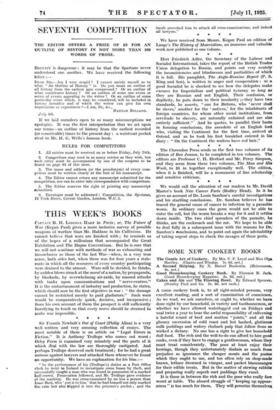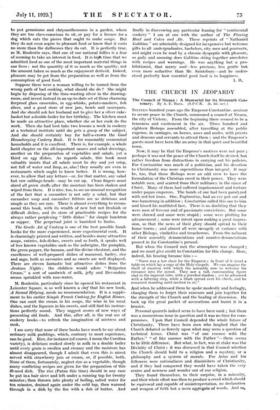SOME NEW COOKERY BOOKS
Good Housekeeping Cookery Book. By Florence B. Jack. (Good Housekeeping Magazine. 2s. 6d. net.) Cakes and Ale and The Flowing Bowl. By Edward Spencer. (Stanley Paul and Co. 2s. 6d. net each.) A GOOD cookery book is, to all right-minded persons, very excellent reading, and a sort of examination of conscience. As we read, we ask ourselves, or ought to, whether we have done right by our household, in variety and toothsomeness, or whether we have allowed waterlogged cod on Fridays and veal twice a year to bear the awful responsibility of enlivening a hateful round of beef and mutton "joints," and all the gloomy succession of cold roast and hot hashed, glutinous milk puddings and watery rhubarb pulp that follow from so wicked a dietary. No one has a right to give her household
dull food. The rich and the well-to-do can afford to hire good cooks, even if they have to engage a gentlewoman, whom they must treat considerately. The poor at least enjoy their herrings, though they unfortunately disdain as much from
prejudice as ignorance the cheaper meats and the pastas which they ought to use, and too often rely on shop-made brawn, lettuce drowned in vinegar, and packet blancmanges for their edible treats. But in the matter of stewing rabbits
and preparing really superb suet puddings they excel.
It is those in between the rich and the poor who really fare worst at table. The absurd struggle of " keeping up appear- ances " is too much for them. They will penurize themselves, to put geraniums and chrysanthemums in a garden, where they are too class-conscious to sit, or pay for a licence for a dog which eats the pieces that ought to make soups. But they do not even aspire to pleasant food or know that it costs no more than the duilnesses they do eat. It is perfectly true, as M. Boulestin says, that one of our national follies is a fear of seeming to take an interest in food. It is high time that we admitted food as one of the most important material things in our lives : not the quantity of it so much as the quality, not the amount taken so much as the enjoyment derived. Indeed, pleasure may be got from the preparation as well as from the consumption of good food.
Suppose there were a woman willing to be turned from the wrong path of bad cooking, what should she do ? She might begin by disposing of the time-wasting silver in the drawing- room, and invest instead in an up-to-date set of those charming fireproof glass casseroles, in egg-whisks, potato-mashers, fish slices, and a good store of new jars, bowls and saucepans. And she should ask her husband not to give her a silver cake- basket but a double-boiler for her birthday. The kitchen must be made an attractive place, whether she or her cook do the work. Then she had best take two lessons a week in cookery
at a technical institute until she gets a grasp of the subject. And she should certainly buy for half-a-crown the Good Housekeeping Cookery Book. It is for reasonably economical households and it is excellent. There is, for example, a whole ,lucid chapter on the all-important sauces and salad dressings, another on the preparation of vegetables and salads, yet a third on egg dishes. As regards salads, this book most valuably insists that all salads must be dry and yet crisp, not full of water and limp, as, alas ! they usually are even in restaurants which ought to know better. It is wrong, how- ever, to allow that any lettuce—or, for that matter, any salad but raw cabbage-heads—may be cut up. Clean fingers must shred all green stuffs after the moisture has been shaken and wiped from them. It is nice, too, to see an unusual recognition of the fact that a cucumber is not only a salad, but that cucumber soup and cucumber fritters are as delicious and simple as they are rare. There is almost everything to recom- mend this book, with its wealth of new but not freakish or difficult dishes, and its store of practicable recipes for the always rather perplexing " little dishes " for simple luncheon or supper. The perpetual joint is banished to limbo.
. The Gentle Art of Cookery is one of the best possible hand- books for the more experienced, more experimental cook. It is charmingly printed and written, and besides many attractive soups, entrees, fish-dishes, sweets and so forth, it speaks well of less known vegetables such as the aubergine, the pumpkin, the green pepper, the banana, and the divine chestnut, and the excellences of well-prepared dishes of macaroni, barley, rice and sago, both as savouries and as sweets are well displayed. There are eleven fantastic but attractive dishes from the Arabian Nights ; the children would adore " Bulgarian Cream," a sort of sandwich of milk, jelly and Devonshire cream sprinkled with rose-water.
M. Boulestin, particularly since he opened his restaurant in Leicester Square, is so well known a chef that his new book, A Second Helping, needs no recommendation. It is a supple- ment to his earlier Simple French Cooking for English Homes. One can omit the cream in his soups, the wine in his meat dishes, and the liqueurs in his sweets, and still find his instruc- tions perfectly sound. They suggest scores of new ways of presenting old foods. And this, after all, is the real use of cookery books—to refresh the imagination of mistress and cook.
' I am sorry that none of these books have much to say about ordinary milk puddings, which, contrary to most experience, can be good. Rice, for instance (of course, I mean the Carolina variety), is delicious cooked slowly in milk in a double boiler until every grain is swollen and creamy and the moisture has almost disappeared, though I admit that even this is nicest served with strawberry jam or cream, or, if possible, both. None of them, fortunately, neglect rice as a vegetable, though many conflicting recipes are given for the preparation of this ill-used dish. The rice (Patna this time) should in any case be put in a hair sieve and left under a running tap for twenty minutes ; then thrown into plenty of boiling, salted water for ten minutes, drained again under the cold tap, then warmed through in a dish by the fire with a dab 'of butter. And finally in disavowing any particular leaning for " continental cookery " I am at one with the author of The Flowing Bowl and Cakes and Ale. These reprints of " Nathaniel Gubbins " are admirably designed for inexpensive but welcome gifts to all undergraduates, bachelors, city men and gourmets, and might even be read by a chronic dyspeptic with pleasure, so gaily and amusing does Gubbins string together anecdotes with recipes and warnings. He was anything but a pro- hibitionist, that merry soul—less precious, less gentle but even more seductive than Mr. Saintsbury—and he under- stood perfectly how essential good food is to happiness.
I. B.



























































 Previous page
Previous page